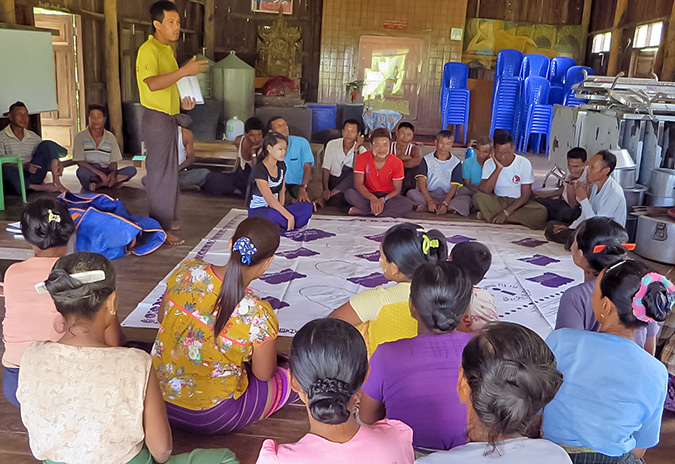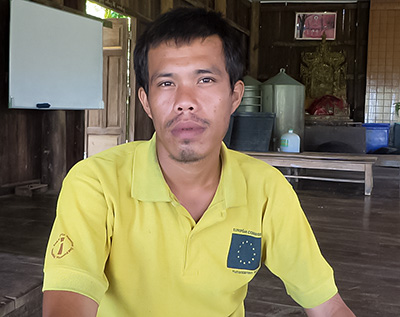In a community in Myanmar, a ‘role model’ changes attitudes and actions
Date:
Author: ActionAid Myanmar
Tha Lu Pyein village, Myanmar — Tin Moe Tun farms for a living, but he is also trying to cultivate something else in his little village: an understanding among the men that it’s not OK to demean and attack women and girls.

The village is poor, and economic opportunities are hard to come by. Many of the men want to live ‘freely’ and don’t like outsiders telling them what to do, some of them find solace in alcohol and the social atmosphere of tea shops. The comfort this offers is short-lived, and an evening’s drinking can result in the men taking out their frustrations over work on their wives and daughters.
But the situation is far from hopeless, says Tin Moe Tun, a ‘male role model’ volunteer who uses anecdotes and games in the tea shops and gathering places in his community to persuade his fellow villagers, that women and men deserve the same rights, to live in safety and to have a say in village affairs.
“Women will participate in the decision-making process in village development activities…[with] the men empowering and supporting them,” he says. “So this is where I will focus my efforts.”
Tin Moe Tun is one of 20 men in two ethnic areas, Kayah State and Rakhine State, whom the NGO ActionAid Myanmar has trained as ‘role models’, as part of a project to stem violence against women by challenging social and cultural norms, which is supported through a grant from the UN Trust Fund to End Violence against Women (UN Trust Fund). These men promote a safe family environment, share their knowledge of women’s rights with other men, and join other men to organize groups to protect women.
Violence against women, particularly husbands against wives, is widespread in Myanmar, and occurs more commonly in the rural areas. It is rooted in traditional patriarchal beliefs and customs, weak institutions and law enforcements, and the practice of settling violent incidents by simply handing over monetary compensation.
Tha Lu Pyein is a farming and fishing village of 392 people in Rambree Township in Rakhine State, on the western coast of Myanmar, with a population of mostly Buddhist and Rakhine ethnicity.

Tin Moe Tun, 31, is married to Ma Win Win Naing, who works as an accountant at the township development organization, and is a paralegal trained by ActionAid Myanmar to provide help and support to her fellow villagers. The couple have one daughter.
Tin Moe Tun does not have any educational background in human rights, but says he grew up with an instinctive sense of social justice. He understood that the women in his village had fewer job opportunities and were affected by violence. In 2013 the Legal Clinic Myanmar visited Tin Moe Tun’s village to run a training on anti-violence in collaboration with ActionAid Myanmar. Tin Moe Tun joined, and after attending several training sessions, began serving as a male role model.In February 2015, the village’s Anti-violence against Women Committee, led by Tin Moe Tun and Ma Win Win Naing, got the township administrators to ban all alcohol sales except with the consent of the villagers. This meant that the nearest alcohol available for purchase was 2-3 hours away, cases of domestic violence have decreased since, and are expected to keep decreasing with the sustained system of education which Tin Moe Tun is implementing. While alcohol consumption is a known risk-factor related to violence, there is more that needs to be done in the community to affect sustainable change.
Tin Moe Tun leads monthly community meetings on good governance and people’s rights. To make the sessions fun and participatory, he uses ActionAid toolkits with games that teach topics including gender equality, different forms of violence and their impacts on people of different backgrounds. Tin Moe Tun says that while most of the villagers agree with him, men aged 20-30 are the least receptive group.
Many of the men objected to outside humanitarian groups interfering in community life. Realizing that to effect real change and realize a major shift in the attitudes of the male population, Tin Moe Tun decided to sit with the men as one of their group, at tea shops or in their homes in the evening. He presents anecdotal problems as talking points: How do you build an elevator in the cheapest way and without taking too much space? How do you get a car through a tunnel that is lower than the height of the car? These benign questions lead to discussions on the development of the village, the political and ethnic conflict in Rakhine state and women’s rights. These discussion points create a comfortable and non-confrontational environment which enables sensitive topics to be introduced.
Tin Moe Tun says that when he brings up the problem of excessive drinking, some of the men reply that they know that they shouldn’t as it affects their ability to make rational decisions. When they discuss sexist cultural norms, some reply that they feel that women actually have more rights than them in the village. They said they have to follow the rules set by their wives, give them all their income, and live in fear of them.
Tin Moe Tun has seen violence in the village decrease in the past three years and credits this to education. He says that he has managed to get four men to stop beating their wives. They are two farmers, 40 and 48; a mason, 30; and a fishing net maker, 39.
The male role model approach is part of ActionAid Myanmar’s project on “Promoting Access to Justice: Towards a Violence-free Environment for Women and Girls.” supported by the UN Trust Fund. The project also works with women and girls in 40 communities in Myanmar to lessen attacks and promote women’s access to justice.
For more information:
Action Aid Myanmar
Khaing Zar Lin
Email: Khaing...@actionaid.org
Website: http://www.actionaid.org/where-we-work/asia-australia/myanmar
FB: ActionAid Myanmar
The UN Trust Fund to End Violence against Women
The UN Trust Fund is the only global grant-making mechanism dedicated to eradicating all forms of violence against women and girls globally. Supporting over 400 organizations over the past 20 years, UN Trust Fund grantees show that with sustained resources and dedicated work, violence against women and girls can be prevented and eliminated. Focusing on prevention of violence, implementation of laws and policies and improving access to vital services for survivors, the UN Trust Fund has spent the past 20 years funding life-changing programmes for millions of women and girls. The UN Trust Fund is managed by UN Women on behalf of the UN system. Website: http://untf.unwomen.org/en
UN Trust Fund Focal Point for UN Women Regional Office for Asia and the Pacific
Nuntana Tangwinit
E-mail: nuntana...@unwomen.org
Website: http://asiapacific.unwomen.org/en/focus-areas/end-violence-against-women/un-trust-fund-to-end-violence
FB: UN Women Asia and the Pacific | Twitter: @UNWOMENASIA